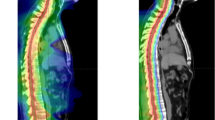Abstract
Leptomeningeal disease (LMD) is well described in patients with brain metastases, presenting symptomatically in approximately 5% of patients. Conventionally, the presence of LMD is an indication for whole brain radiation therapy (WBRT) and not suitable for stereotactic radiosurgery (SRS). The purpose of the study was to evaluate the local control and overall survival of patients who underwent SRS to focal LMD. We reviewed our prospective registry and identified 32 brain metastases patients with LMD, from a total of 465 patients who underwent SRS between 2013 and 2015. Focal LMD was targeted with SRS in 16 patients. The median imaging follow-up time was 7 months. The median volume of LMD was 372 mm3 and the median margin dose was 16 Gy. Five patients underwent prior WBRT. Histology included non-small cell lung (8), breast (5), melanoma (1), gastrointestinal (1) and ovarian cancer (1). Follow-up MR imaging was available for 14 patients. LMD was stable in 5 and partially regressed in 8 patients at follow-up. One patient had progression of LMD with hemorrhage 5 months after SRS. Seven patients developed distant LMD at a median time of 7 months. The median actuarial overall survival from SRS for LMD was 10.0 months. The 6-month and 1-year actuarial overall survival was 60% and 26% respectively. Six patients underwent WBRT after SRS for focal LMD at a median time of 6 months. Overall, focal LMD may be may be treated successfully with radiosurgery, potentially delaying WBRT in some patients.



Similar content being viewed by others
References
Patchell RA, Posner JB (1985) Neurologic complications of systemic cancer. Neurol Clin 3:729–750
Kesari S, Batchelor TT (2003) Leptomeningeal metastases. Neurol Clin 21:25–66
Shapiro WR, Johanson CE, Boogerd W (2009) Treatment modalities for leptomeningeal metastases. Semin Oncol 36:S46–S54. doi:10.1053/j.seminoncol.2009.05.006
Wasserstrom WR, Glass JP, Posner JB (1982) Diagnosis and treatment of leptomeningeal metastases from solid tumors: experience with 90 patients. Cancer 49:759–772
Leal T, Chang JE, Mehta M, Ian Robins H (2011) Leptomeningeal metastasis: challenges in diagnosis and treatment. Curr Cancer Ther Rev 7:319–327. doi:10.2174/157339411797642597
Hermann B, Hültenschmidt B, Sautter-Bihl ML (2001) Radiotherapy of the neuroaxis for palliative treatment of leptomeningeal carcinomatosis. Strahlenther Onkol 177:195–199
Bertke MH, Burton EC, Shaughnessy JN (2016) Stereotactic radiosurgery as part of multimodal treatment in a bulky leptomeningeal recurrence of breast cancer. Cureus. doi:10.7759/cureus.523
Le Rhun E, Taillibert S, Chamberlain MC (2013) Carcinomatous meningitis: leptomeningeal metastases in solid tumors. Surg Neurol Int 4:S265–S288. doi:10.4103/2152-7806.111304
Fan FS (2016) Rapid response to high-dose, pulsatile erlotinib in afatinib-refractory leptomeningeal carcinomatosis from adenocarcinoma of the lung: a case report. Case Rep Oncol 9:537–542. doi:10.1159/000449405
Sakata Y, Kawamura K, Shingu N, Ichikado K (2016) Erlotinib plus bevacizumab as an effective treatment for leptomeningeal metastases from EGFR mutation-positive non-small cell lung cancer. Lung Cancer 99:120–122. doi:10.1016/j.lungcan.2016.07.008
Sekine A, Kato T, Iwasawa T et al (2016) Promising effects of afatinib on leptomeningeal carcinomatosis derived from erlotinib-resistant lung adenocarcinoma. Intern Med 55:2457–2461. doi:10.2169/internalmedicine.55.6102
ALEX study: a randomized, phase III study comparing alectinib with crizotinib in treatment-naive anaplastic lymphoma kinase-positive advanced non-small cell lung cancer participants. In: ClinicalTrials.gov [Internet]. Bethesda, MD: National Library of Medicine (US). 2014-[cited 2015 Nov 2]. http://clinicaltrials.gov/show/NCT02075840. NLM Identifier: NCT02075840)
Funding
Our center receives technical support from Elekta AB toward maintaining our data registry.
Author information
Authors and Affiliations
Corresponding author
Ethics declarations
Conflict of interest
The authors declare that they have no conflict of interest.
Informed consent
The Gamma Knife registry is approved by the NYU Institutional Research Board.
Rights and permissions
About this article
Cite this article
Wolf, A., Donahue, B., Silverman, J.S. et al. Stereotactic radiosurgery for focal leptomeningeal disease in patients with brain metastases. J Neurooncol 134, 139–143 (2017). https://doi.org/10.1007/s11060-017-2497-6
Received:
Accepted:
Published:
Issue Date:
DOI: https://doi.org/10.1007/s11060-017-2497-6




